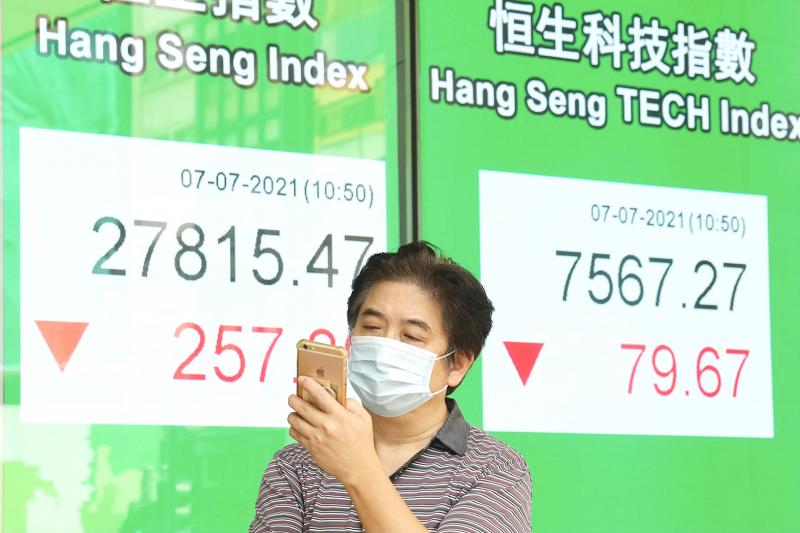An index launched a year ago to give investors greater exposure to China’s Internet giants is now the world’s worst-performing major technology gauge.
The Hang Seng Tech Index has been on a roller-coaster ride in the past 12 months. The gauge, which marks its first anniversary on Tuesday, was up 59 percent at its February peak, but has since seen more than US$551 billion in market value wiped out amid Beijing’s clampdown on the sector.
That has reduced its gain to nearly 6 percent, compared with more than 40 percent for the MSCI World Information Technology Index and the NASDAQ-100 Index. The measure also lags onshore peers — the ChiNext Index is up 35 percent for the period.

Photo: AP
The underperformance highlights regulatory risks for one of the fastest-growing sectors of China’s economy. Beijing’s bold moves to rein in the nation’s powerful tech firms, such as Jack Ma’s (馬雲) Ant Group Co (螞蟻集團) and Didi Global Inc (滴滴), have sent global investors fleeing on concerns over China’s tighter grips on data.
“The ongoing concern that medium-term earnings power may be dented by their data becoming more of a public good, and privacy becoming more of an issue, remains a headwind,” Robeco Hong Kong Ltd portfolio manager Joshua Crabb said.
Bank of America Corp strategists wrote in a note last week that the regulatory overhang is unlikely to dissipate any time soon, instead recommending investors to rotate into tech firms outside of China.
Launched last year, the gauge tracks the 30 largest Hong Kong-listed tech firms, including giants such as Tencent Holdings Ltd (騰訊), Alibaba Group Holding Ltd (阿里巴巴) and Meituan (美團). It was set in motion at a time when Chinese tech companies were looking to list closer to home as growing tensions between Washington and Beijing threatened to curtail access to US capital markets.
The index took a fresh beating this month — down 11 percent — after China ordered a ban on new users from downloading Didi’s app. Regulators are considering unprecedented penalties for the ride-hailing company following a controversial initial public offering, people familiar with matter have said.
While the forward price-to-earnings ratio for the Hang Seng Tech Index has slumped from a February peak, it is still trading at about 35 times estimated profits, compared with 28 times for the NASDAQ-100 Index and 43 times for the ChiNext, Bloomberg’s data show.
That has not deterred some. Hong Kong’s two most popular exchange-traded funds this year are those tracking the tech gauge. The combined total assets of all such ETFs have more than doubled in size this year to US$3.8 billion, and the pace of investment into the products has accelerated since mid-May.
“Some long-term institutions may have started buying these Hang Seng tech ETFs. It seems that the more the index falls, the more ETFs they will buy,” Zhongtai Financial International Ltd (中泰金融國際) analyst Alvin Ngan said.
While some see the uncertainty created by the ongoing crackdown as a buying opportunity, others remain wary amid questions over its duration and where it might head next.
Jian Shi Cortesi, a fund manager at GAM Investment Management in Zurich, said the bottom will not be seen until investors have seen the conclusion of tightening regulations.

The US dollar was trading at NT$29.7 at 10am today on the Taipei Foreign Exchange, as the New Taiwan dollar gained NT$1.364 from the previous close last week. The NT dollar continued to rise today, after surging 3.07 percent on Friday. After opening at NT$30.91, the NT dollar gained more than NT$1 in just 15 minutes, briefly passing the NT$30 mark. Before the US Department of the Treasury's semi-annual currency report came out, expectations that the NT dollar would keep rising were already building. The NT dollar on Friday closed at NT$31.064, up by NT$0.953 — a 3.07 percent single-day gain. Today,

‘SHORT TERM’: The local currency would likely remain strong in the near term, driven by anticipated US trade pressure, capital inflows and expectations of a US Fed rate cut The US dollar is expected to fall below NT$30 in the near term, as traders anticipate increased pressure from Washington for Taiwan to allow the New Taiwan dollar to appreciate, Cathay United Bank (國泰世華銀行) chief economist Lin Chi-chao (林啟超) said. Following a sharp drop in the greenback against the NT dollar on Friday, Lin told the Central News Agency that the local currency is likely to remain strong in the short term, driven in part by market psychology surrounding anticipated US policy pressure. On Friday, the US dollar fell NT$0.953, or 3.07 percent, closing at NT$31.064 — its lowest level since Jan.

Hong Kong authorities ramped up sales of the local dollar as the greenback’s slide threatened the foreign-exchange peg. The Hong Kong Monetary Authority (HKMA) sold a record HK$60.5 billion (US$7.8 billion) of the city’s currency, according to an alert sent on its Bloomberg page yesterday in Asia, after it tested the upper end of its trading band. That added to the HK$56.1 billion of sales versus the greenback since Friday. The rapid intervention signals efforts from the city’s authorities to limit the local currency’s moves within its HK$7.75 to HK$7.85 per US dollar trading band. Heavy sales of the local dollar by

The Financial Supervisory Commission (FSC) yesterday met with some of the nation’s largest insurance companies as a skyrocketing New Taiwan dollar piles pressure on their hundreds of billions of dollars in US bond investments. The commission has asked some life insurance firms, among the biggest Asian holders of US debt, to discuss how the rapidly strengthening NT dollar has impacted their operations, people familiar with the matter said. The meeting took place as the NT dollar jumped as much as 5 percent yesterday, its biggest intraday gain in more than three decades. The local currency surged as exporters rushed to